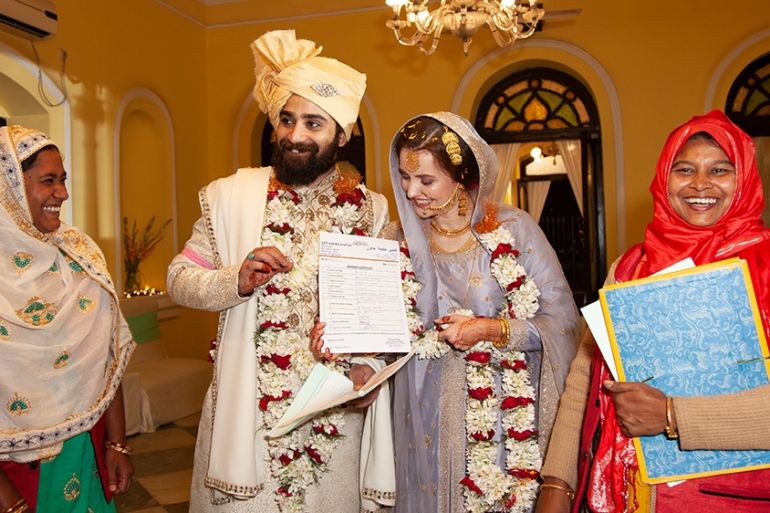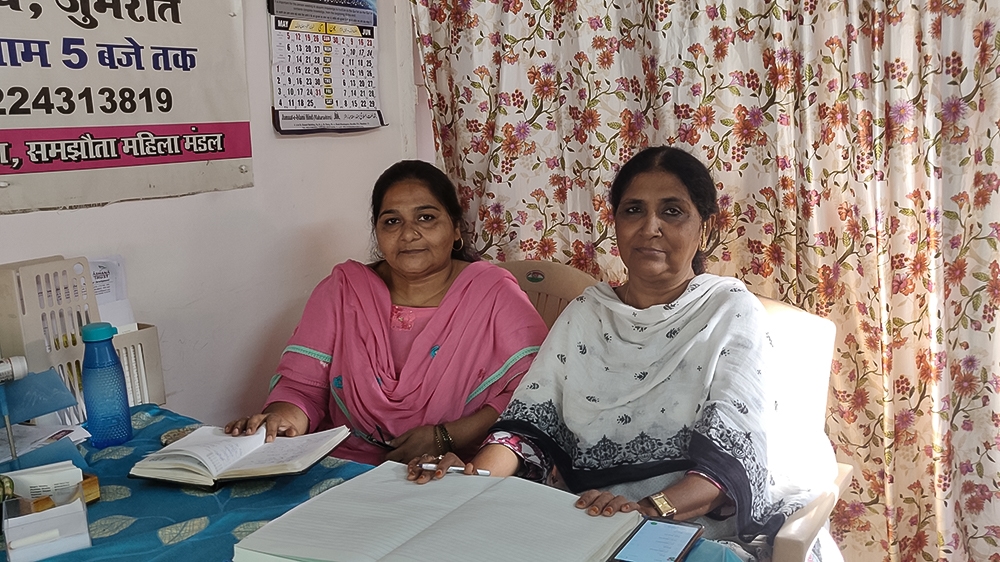The rise of female Sharia judges in India
Female ‘qazis’ are increasingly responsible for governing Islamic law, a role traditionally performed by men.

Mumbai, India – Earlier this year, Maya Rachel McManus, a British Muslim, walked down the aisle in Kolkata on her wedding day and exchanged garlands with her partner.
Later, her marriage was solemnised by female qazis, or judges, who govern Islamic law.
Keep reading
list of 4 itemsTen years after Chibok girls kidnapping: One woman’s struggle to move on
Poland lawmakers take steps towards liberalising abortion laws
Arizona’s top court allows near-total 1864 abortion ban to go into effect
“Maybe my multicultural wedding would have been frowned upon if the qazis were men,” McManus told Al Jazeera, adding that the couple was not satisfied with the male judges they had approached.
Along with her husband, Maya decided that she wanted women to perform her wedding rites.
“This was the first time one of our qazis solemnised a marriage,” said Noorjehan Safia Niaz, cofounder of Bhartiya Mahila Muslim Andolan (BMMA), an organisation that launched in 2007 in India advocating for secular rights.
In 2016, BMMA began training Muslim women to become qazis, a role traditionally held by men.
To McManus, and many of India’s millions of Muslims, the recent rise of female qazis means fewer compromises and a chance at more justice for women.
“What is common between all versions of Sharia or Islamic law that is followed today is that it is extremely patriarchal,” said Niaz, who is also a qazi.
“Women continue to suffer. They become victims of nikkah halala (a practise where a woman once divorced by her husband must consummate her marriage with another man if she wants to remarry her first husband), polygamous marriages and unilateral divorces.”
There are no teachings in either the Quran or the prophetic tradition that prohibits women from being qazis. Even the wife of the Prophet Muhammad, known as Sayyida Aisha, performed and solemnised the nikah of several people.
To replace what Niaz describes as a “misogynistic syllabus” designed for male qazis, BMMA drafted its own curriculum in which women study the Quran from a feminist perspective and examine the Indian constitution so they can make decisions, keeping in mind the law of the land.
“The practice of female [qazis] is novel in India, but the idea is not novel,” says Ebrahim Moosa, a professor of Islamic studies at Indiana’s University of Notre Dame. “Muslims in North India followed the Hanafi school of law for centuries that allows women to be judges.”
According to BMMA, which is funded by private donors and charities, there are 15 female qazis spread across India including West Bengal, Maharashtra, Karnataka, Rajasthan, Tamil Nadu, and Orissa.
“We have over 150 cases in our centre alone,” said 47-year-old Hina Siddiqui, a qazi from Bandra, a western Mumbai suburb. “Though unlike male qazis, in each case we summon both the man and the woman involved. We don’t hear just one side of the story.”

Since triple talaq, or instant divorce, led by Muslim men was made unconstituional in India, Siddiqui and her colleagues have seen an increase in the number of distressed women in their offices.
“The men are now scared to give triple talaq,” said 60-year-old Zubeda Khatoon, another qazi in Bandra.
“So they abuse their wives both physically and emotionally, hoping that the woman will leave them instead. Another way this works in the man’s favour is that according to Sharia law if a woman asks for a divorce, her husband owes her no liabilities. “
This is where female qazis step in and attempt to ensure that women receive their legal rights during including receiving her mehr – a sum of money given to the bride on her wedding day, alimony and the belongings she contributed to the home after marriage.
For couples who wish to be married by a female qazi, there is a rigorous process.
Through a period of one month, the judges verify the bride and groom’s details – including their identity, economic status, marital status and even their marzi, or personal reasons for wedlock. This is to reduce the rate of fraudulent marriages.
“They [the female qazis] explained the various aspects of the nikah [wedding] procedure to me. They were extremely helpful,” said McManus. “This kind of support was not forthcoming from the male qazis I had approached earlier.”
‘No such thing as women qazis’
But not everybody agrees that female qazis can better safeguard the interests of Muslim women.
“There is no such thing as women qazis in Islam. It is just a new-age thing,” Muslim leader Syed Moinuddin Ashraf, from Sunni Jama Mosque in Mumbai, told The Hindustan Times.
Moosa, the professor in Indiana, said while some schools of Islamic thought such as Shafi’i, Ahl-e Hadis, and Salafi, prevent women from becoming qazis, it remains religiously permissible.
“There are no teachings in either the Quran or the prophetic tradition that prohibits women from being qazis,” he said. “Even the wife of the Prophet Muhammad, known as Sayyida Aisha, performed and solemnised the nikah of several [people].”
In the two years that Siddiqui and Khatoon have been practising as qazis in Mumbai, they have presided over only one mutually consenting divorce.
“In that case, we were able to get the woman two lakhs ($2,874) as maintenance from her husband,” said Khatoon. “But most people still prefer to have their divorce issued on the letterhead of male qazis.”
According to Niaz, 30 more women eager to enrol in the second batch of qazi training by BMMA.
“Maya’s wedding [McManus’s] went through without any objections,” she says. “We haven’t had any fatwas issued for the work we [female qazis] are doing. We exist. That in itself is a positive thing.”
